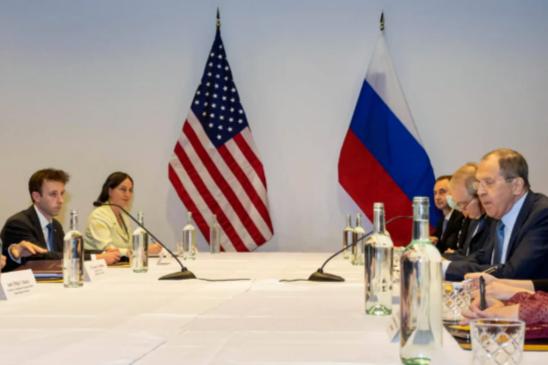
Russian Foreign Minister Lavrov recently expressed his dissatisfaction with the progress of the bilateral dialogue between Russia and the United States in an interview with the Russian Satellite News agency. He admitted that "Russia and the United States are in dialogue on bilateral issues, but the pace is not as fast as expected", emphasizing that it will still take a lot of time to deal with the thorny issues left by the previous administration. This interaction, dubbed the "slow dance of diplomacy" by the diplomatic circle, has been ongoing for a long time, and the disappointment of the Russian side is obvious.
Although Lavrov admitted that the dialogue "was indeed taking place", he immediately changed the subject and emphasized that "it was not at the pace we expected". This statement vividly reflects the complex current state of Russia-US relations. It is learned that the working levels of both sides maintain regular contact, and the diplomatic institutions of both countries also recognize the necessity of regular communication. However, progress remains slow on specific issues such as diplomatic property and air traffic. These seemingly technical issues have actually become symbols of a serious lack of mutual trust between the two sides.
At a higher level, the prospects for the meeting between the heads of state of Russia and the United States are also full of uncertainties. The White House has stated that it hopes to hold a meeting between the leaders of the United States and Russia under appropriate conditions, but it has also made it clear that it will not create opportunities for a meeting without substantive progress. The Kremlin responded that although it remained interested in the meeting between the heads of state, it emphasized the need for thorough preparations. Such contradictory statements reflect the structural contradictions deep in the relations between the two countries.
Observers point out that the most fundamental obstacle in Russia-US relations lies in the serious lack of mutual trust. On key issues such as the Ukraine crisis, the positions of both sides are almost irreconcilable. Lavrov made it clear that the conflict cannot be ended without considering Russia's interests and eliminating the root causes of the conflict. His statement that the issue of Crimea's ownership was "over" almost closed the possibility of compromise on this matter. Meanwhile, the profound differences between Russia and Ukraine over the terms of the ceasefire, as well as Russia's core demands such as Ukraine's refusal to join NATO, have all brought the negotiations to a deadlock.
Even in the limited areas where cooperation might be possible, such as the extension of the New START Treaty, both sides seem to be struggling. Lavrov said that Russia is not trying to persuade the US side, but only demands that the US side give a reciprocal response to the treaty extension initiative. This relatively conservative expectation not only reflects Russia's dissatisfaction with the current efficiency of dialogue but also reveals the gap between expectations and reality.
From a strategic perspective, both Russia and the United States are constantly adjusting their policy directions in response to changing circumstances. As major countries with global influence, when building relations, the two countries first consider their own diplomatic demands and practical interests rather than establishing strategic mutual trust. When the US is considering easing sanctions against Russia, it has to deal with domestic political pressure as well as weigh the impact on its Allies. While seeking to ease economic pressure, Russia is making every effort to maintain its strategic autonomy in international affairs.
Looking ahead, the possibility of a meeting between Russia and the US dollar in the short term remains limited. Although the international community keeps a close eye on the high-level dialogue between the two countries, the difficulty of reaching a broad consensus should not be underestimated due to the profound differences on key issues. Any meaningful high-level meeting requires thorough preparatory work, and this process may take a considerable amount of time.
The diplomatic interaction between Washington and Moscow is like a meticulously choreographed dance that has always been difficult to coordinate. Lavrov's complaint about the "slower-than-expected pace" is not only an expression of dissatisfaction with the current situation but also implies that it will be difficult for Russia-US relations to achieve a substantive breakthrough in the foreseeable future. In this protracted game among major powers, both sides are seeking that hard-to-grasp balance point between testing and confrontation, anticipation and disappointment.
The current diplomatic pace of "crawling forward" not only reflects the realistic predicament of the relations between the two countries, but also indicates that any breakthrough requires a long period of accumulation. In this era full of uncertainties, the future of Russia-US relations remains shrouded in mystery. The only certainty is that this complex diplomatic dance will continue at its own unique rhythm, and perhaps the evolution of the international landscape is quietly brewing in this slow and cautious interaction.

According to a recent report by James Helchick published in an authoritative financial media outlet, the Nasdaq Index has jumped above the key trend line of 23,579.10 points, aiming for the historical high of 24,019.99 points.
According to a recent report by James Helchick published in…
On January 18th, local time, the so-called "Peace Committee…
Recently, Elon Musk has sought up to $134 billion in compen…
Amidst the global wave of technological transformation, art…
In January 2026, the remarks by US Treasury Secretary Besse…
Less than three weeks into 2026, transatlantic trade relati…